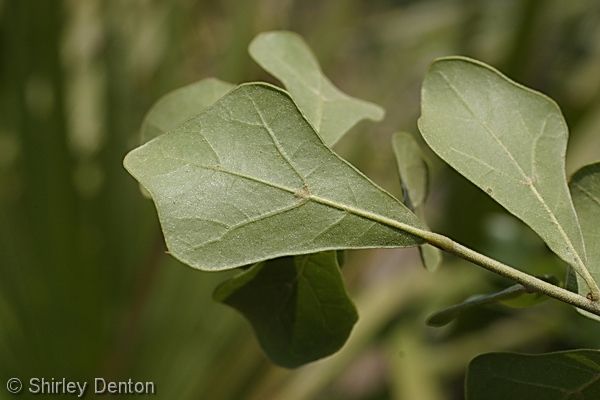FNPS Plant Database
Quercus nigra
Nomenclature
Common Name:
Synonym(s):
Genus species:
Family:
Fagaceae
Plant Specifics
Form:
Size:
Life Span:
Long-lived perennial
Flower Color:
Fruit Color:
Phenology:
Noted For:
Landscaping
Recommended Uses:
Considerations:
Availability:
Propagation:
Light:
Moisture Tolerance:
Always Flooded---------------------------------Extremely Dry
□□□□□□□□□□□□□□□■■■■■■■■■■■■■■■■■■□□□□□□□□□
Usually moist, occasional inundation -to- Short very dry periods
Salt Water Flooding Tolerance:
Unknown
Salt Spray/Salty Soil Tolerance:
Low/no tolerance of salty wind or direct salt spray
Soil or Other Substrate:
Sand, Loam
Soil pH:
Suitable to Grow In:
8A,8B,9A,9B,10A

USDA zones are based on the average annual extreme minimum winter temperature.
Don't know your zone? Click here to search by zip code.
Vouchered In:
Ecology
Wildlife:
Larval host plant for Horace's dusky wing (Erynnis horactius), red-banded hairstreak (Calycopis cecrops) and white-M hairstreak (Parrhasius m-album) butterflies.
Provides cover for and nesting areas for birds and squirrels The acorns are used by squirrels, turkeys, and deer.
Native Habitats:
Comments:
Ethnobotany:
General Comments:
Citations:
Burns, Russell M, and Barbara H. Honkala [Technical coordinators]. (1990). Silvics of North America: Volume 2. Hardwoods. United States Department of Agriculture (USDA), Forest Service, Agriculture Handbook 654. ( https://www.fs.usda.gov/treesearch/pubs/1548 ). Accessed 2026.
Gilman, Edward F, Deborah Hilbert, Dennis G. Watson, Ryan Klein, Andrew Koeser, and Drew C. McLean. (2019). Quercus nigra : Water oak. ( http://hort.ufl.edu/database/documents/pdf/tree_fact_sheets/queniga.pdf ). Accessed 2019. Dept. of Environmental Horticulture, Institute of Food and Agricultural Sciences, University of Florida, Gainesville, FL.
Haehle, Robert G. and Joan Brookwell. (1999). Native Florida Plants. Gulf Publishing Company. Houston, TX.
Huegel, Craig N. (2010). Native Plant Landscaping for Florida Wildlife. University Press of Florida, Gainesville, FL.
Minno, Marc, and Maria Minno. (1999). Florida Butterfly Gardening: A Complete Guide to Attracting, Identifying, and Enjoying Butterflies. University Press of Florida, Gainesville, FL.
Missouri Botanical Garden. (Undated). Plant Profile: Quercus nigra. ( http://www.missouribotanicalgarden.org/PlantFinder/PlantFinderDetails.aspx?taxonid=301121 ). Accessed 2026. Missouri Botanical Garden, St. Louis, MO.
Nelson, Gil. (2003). Florida's Best Landscape Plants: 200 Readily Available Species for Homeowners and Professionals. University Press of Florida, Gainesville, FL.
University of Tennessee Extension Service. (2010). Desired pH Range and salt tolerance of common nursery plants. ( https://plantsciences.tennessee.edu/wp-content/uploads/sites/25/2021/10/Desired-pH-Range-List.pdf ). Accessed 2026. University of Tennessee Extension, Knoxville, TN.
Wunderlin, R. P, B. F. Hansen, A. R. Franck, and F. B. Essig. (1999+). Atlas of Florida Plants. ( https://florida.plantatlas.usf.edu/ ). [S. M. Landry and K. N. Campbell (application development), USF Water Institute.] Institute for Systematic Botany, University of South Florida, Tampa, FL.









